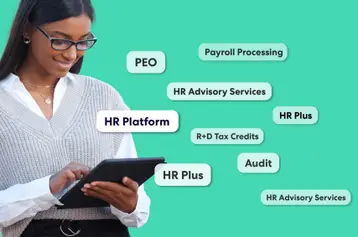Administrative Services Organization Pros and Cons

Table of contents
- 1.Core Functions of ASOs in HR
- 2.Payroll Tax Administration
- 3.Payroll processing
- 4.Risk mitigation
- 5.Support the employee life cycle
- 6.Employee engagement
- 7.Unemployment and workers' compensation support
- 8.Administering benefits
- 9.Reviewing policies and procedures
- 10.Strategic planning
- 11.Data analysis
- 12.Pros of Working With an ASO
- 13.Providing an opportunity to increase business growth
- 14.Mitigating certain risks
- 15.Increasing efficiency
- 16.Optimizing costs
- 17.Accessing professional expertise
- 18.Improving productivity
- 19.Better retention efforts
- 20.Using best practices
- 21.Ability to pay by the service
- 22.Auditing
- 23.Cons of Working With an ASO
- 24.Challenges in personalization and flexibility
- 25.Dependence on external organizations for critical functions
- 26.Co-employment
- 27.Not having the access to premium level benefit options
- 28.Making the Call on Outsourcing to an ASO
- 29.Assessing business needs and goals
- 30.Evaluating the impact on workforce management and culture
- 31.Considerations for scalability and business growth
- 32.Technology integration and data analysis for decision-making
- 33.Weighing the Administrative Services Organization Pros and Cons
An administrative services organization (ASO) provides professional services to companies that want to outsource their human resources operations. Working with an ASO provides you with a team of dedicated experts who will help the services you choose to outsource, which may include payroll processing, payroll tax administration, and other HR functions. Some companies can save significant money by working with an ASO instead of hiring an in-house HR manager.
This article will discuss administrative services organization pros and cons to help you decide whether an ASO is the right choice for your business.
Core Functions of ASOs in HR
ASOs provide a variety of outsourced HR services for companies. These may include:
Payroll Tax Administration
ASO payroll tax experts provide support businesses by providing expertise in payroll tax rules and requirements. ASO experts may be able to help companies with payroll taxes by providing services like:
- Register federal, state, and local payroll tax accounts.
- Monitor workforce changes that require accounts in new payroll tax jurisdictions.
- Monitor any requirements or changes in the payroll tax jurisdictions that may affect your business.
Payroll processing
According to the U.S. Department of Labor, it enforces more than 180 federal laws. ASO professionals may have expert knowledge of local, state, and federal rules and requirements that govern payroll processing. They keep up with evolving payroll rules and requirements to help your company comply. An emerging trend for ASOs is the use of artificial intelligence (AI) that may be able to help with automate repetitive, routine HR administrative tasks. Though still an evolving area of HR, businesses should be aware of AI tools that may be able to help reduce time.
Payroll processing services may include essential and tedious functions like:
- Preparing company payroll runs.
- Reviewing benefits and deductions.
- Processing off-cycle payroll requests like bonuses, end of year disbursements and reimbursements.
- Processing termination payroll runs per governing jurisdiction requirements.
- Administering workers’ compensation payroll reporting.
- Entering payroll changes.
Risk mitigation
ASOs can also help mitigate certain risks by providing expertise in areas of HR or payroll processing to help businesses stay up to date with employment-related rules and requirements.[MN3]
Support the employee life cycle
An ASO can help support by monitoring and supporting onboarding new employees and offboarding those who are leaving. The ASO team helps support your new employees get up to speed and helps keep the off-boarding process run smoothly.
Employee engagement
ASOs can provide HR support in employee engagement in tasks that include performance reviews, training, and employee discipline.
Unemployment and workers' compensation support
ASOs help by providing necessary documentation for unemployment claims and administering payroll reporting for workers’ compensation.
Administering benefits
When you work with an ASO, your company sponsor its benefits that you offer to your employees. ASO services may include administering the benefits enrollment process. The types of benefits that ASOs may also administer include health insurance, time off, retirement plans, and other benefits.
Reviewing policies and procedures
An ASO can help review policies and procedures. The ASO can help streamline your business operations by offering best practices and guidance to help you can craft and revise your policies.
Strategic planning
ASOs can help your bottom line with certain consulting services such as short and long-term business planning, strategic guidance, and additional organizational consulting services.
Data analysis
As part of your ASO relationship, you may subscribe to a sophisticated software system — an HRIS — that you can use to help generate custom analytics reports. These can identify market trends that affect your industry and provide insights you can use to optimize workforce management. There’s an emerging trend to use AI and machine learning to help identify more complex data interactions and provide reports that can be even more useful.
Pros of Working With an ASO
The advantages of working with an ASO include:
Providing an opportunity to increase business growth
When you work with an ASO, the ASO team will help with time-consuming, routine HR tasks. That will help free up the time of the company’s in-house staff — time that they can use to focus on your core business strategy and goals.
Mitigating certain risks
Small and medium-sized companies often don’t have the resources or expertise to keep up with complex employment-related rules and requirements. An ASO’s experts can help. You gain expertise to help you comply.
Increasing efficiency
An ASO's experts and software can handle time-consuming HR processes more quickly than you can. Outsourcing paperwork and streamlining workflow will increase your company’s efficiency. Your HR personnel can focus on projects that have a more direct impact on your bottom line, such as attracting and retaining top talent to your company.
Optimizing costs
Working with an ASO can help reduce costs by its economy of scale for performing HR functions. It’s a cost-effective option to consider when budgeting is important.
Accessing professional expertise
An ASO’s professional experts can provide you with a level of knowledge that would be difficult for a small or medium company to maintain in-house. By consulting with the ASO’s human resources and compliance experts, you can access the same advantages that larger firms may enjoy.
Improving productivity
An ASO's data analytics can help improve the productivity of employees such as engaging for consulting services to include training programs to help employees reach their top potential in your company. And workforce management analytics can help provide insights to your company so you can develop the skill sets it needs to maximize productivity and make sure employees are in the roles where they can be most productive.
Better retention efforts
Using an ASO can help your employees with timely payroll processing. The process of enrolling in benefits can also be streamlined. Individualized feedback and training plans can help increase employee engagement. All of these contribute to employee satisfaction, helping with retention efforts.
Using best practices
The expertise of an ASO’s professional teams can help put you on the leading edge in many of the challenges your company faces: enhancing business processes, technology integration, financial reporting, and scalability.
Ability to pay by the service
While other types of HR outsourcing providers may charge a flat fee per employee or a percentage of total payroll for comprehensive HR outsourcing, an ASO may give you more flexibility in the ability pick and pay for just the services that you subscribe to.
Auditing
What you don't know can hurt your business — badly. ASOs can help identify potential issues by performing audits to review your current HR processes and operations in areas like:
- Payroll taxes
- HR employee documentation
- Recruiting processes
- Onboarding and offboarding
- HR documentation storage
- Benefit offerings
Then, the ASO's experts can help you identify areas of concerns so you can address them.
Cons of Working With an ASO
Although there are many benefits to working with an ASO, it might not be for every business. When making a decision about ASOs, these are some things to consider:
Challenges in personalization and flexibility
An ASO may offer the ability to personalize your plan to some extent by adding options for particular services you need and allow you to choose from different levels of plans. However, in general, the plans are fairly standardized. If your needs are out of the ordinary, this could present a challenge.
Dependence on external organizations for critical functions
When you work with an ASO and outsource your HR tasks, you need to be comfortable with not having HR functions performed in-house and turning your data over to an outside party. It’s important that you work with an ASO that you can trust with these critical functions.
Co-employment
A PEO is a professional employer organization that provides outsourcing comprehensive HR services. A PEO becomes the employer of record for W-2 purposes and payroll tax purposes. A PEO assumes the responsibility of certain payroll tax administration for payroll paid through its platform.
A PEO may also provide other risk mitigation services such as employment practices risk mitigation for claims such as discrimination, wrongful termination, retaliation and harassment. Its services may help prevent concerns from occurring in these areas and also provide support if claims are filed.
An ASO is not a co-employer for payroll tax purposes although they can provide expertise-related services.
Not having the access to premium level benefit options
PEOs provide access to robust medical and retirement benefits. It can give big-company options to small and medium-sized clients that they could not obtain on their own. ASOs do not have this economy of scale and do not offer benefit plans.
Making the Call on Outsourcing to an ASO
Deciding whether to outsource additional HH services to an ASO is an important decision. It’s best to approach it methodically. Key steps to consider are:
Assessing business needs and goals
Review your plans for your current HR department, if you have one, and how those plans fit into your overall business goals. Do you need to spend less on administrative costs, increase efficiency, or free up your employees’ time to work on higher-level projects? Do you expect speedy growth that would make it more affordable to maintain HR functions in-house?
Evaluating the impact on workforce management and culture
Consider whether working with an ASO will enhance your company’s workforce management and culture. Do you need to be less involved in HR and payroll tasks? Could you increase employee satisfaction with individualized performance review, goal-setting, and training plans? Are you certain that your employees are using their skills where they are most needed? Do you have a clear idea of which skills you need to pull into the company through new hires?
Considerations for scalability and business growth
Do you have a goal of growing your business? If so, when choosing an ASO, look for one that can scale as you grow. Once you work with an ASO, it’s to your advantage to stay with them so that you don’t have to take the time and expense of finding and starting over with a new provider.
Technology integration and data analysis for decision-making
The technology used for HR processes is rapidly evolving. AI can help ASOs increase efficiency and handle more complex tasks, like automation. Data analysis is also playing an increasingly important role in giving companies a competitive edge.
When deciding whether to work with an ASO, consider how helpful it will be for your company to have access to the latest technology. Would it be easier and less expensive to work with an ASO that has the technological capabilities you need rather than developing and maintaining them in-house. When choosing among ASOs, look for one that can integrate its technology with any software systems that you are using and want to keep.
Weighing the Administrative Services Organization Pros and Cons
Adding to our technology platform including dedicated expertise and support teams, HR Plus services is an ASO industry leader. We offer three service levels based on your needs: payroll tax compliance manager, payroll manager and our popular option, HR manager for companies that want to outsource most of their HR functions. We can help companies save time and optimize cost.
We invite you to book a demo so you can see for yourself how HR Plus can benefit your company.

TriNet Team
Table of contents
- 1.Core Functions of ASOs in HR
- 2.Payroll Tax Administration
- 3.Payroll processing
- 4.Risk mitigation
- 5.Support the employee life cycle
- 6.Employee engagement
- 7.Unemployment and workers' compensation support
- 8.Administering benefits
- 9.Reviewing policies and procedures
- 10.Strategic planning
- 11.Data analysis
- 12.Pros of Working With an ASO
- 13.Providing an opportunity to increase business growth
- 14.Mitigating certain risks
- 15.Increasing efficiency
- 16.Optimizing costs
- 17.Accessing professional expertise
- 18.Improving productivity
- 19.Better retention efforts
- 20.Using best practices
- 21.Ability to pay by the service
- 22.Auditing
- 23.Cons of Working With an ASO
- 24.Challenges in personalization and flexibility
- 25.Dependence on external organizations for critical functions
- 26.Co-employment
- 27.Not having the access to premium level benefit options
- 28.Making the Call on Outsourcing to an ASO
- 29.Assessing business needs and goals
- 30.Evaluating the impact on workforce management and culture
- 31.Considerations for scalability and business growth
- 32.Technology integration and data analysis for decision-making
- 33.Weighing the Administrative Services Organization Pros and Cons






